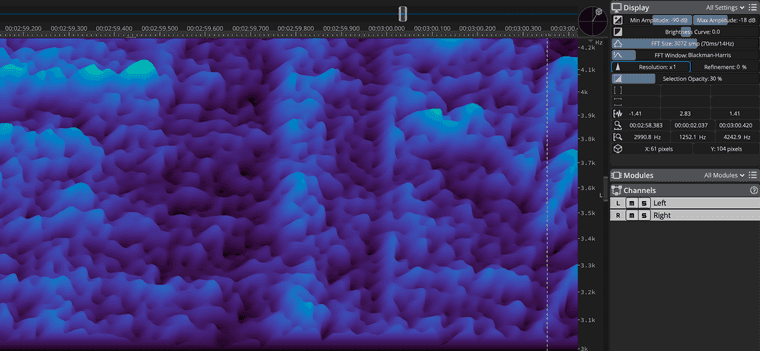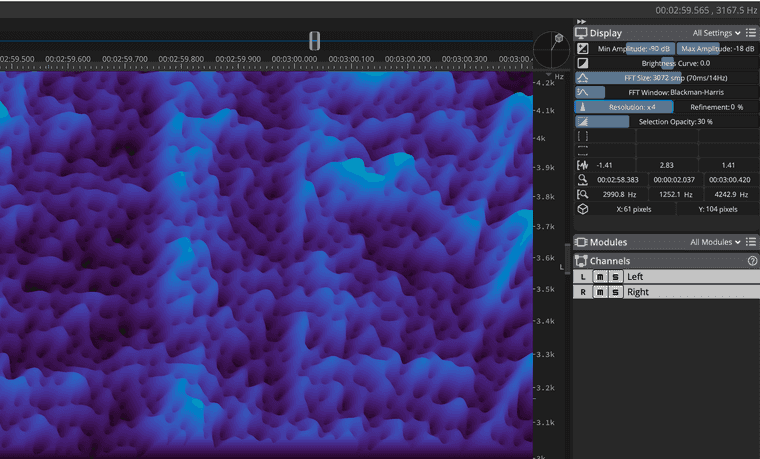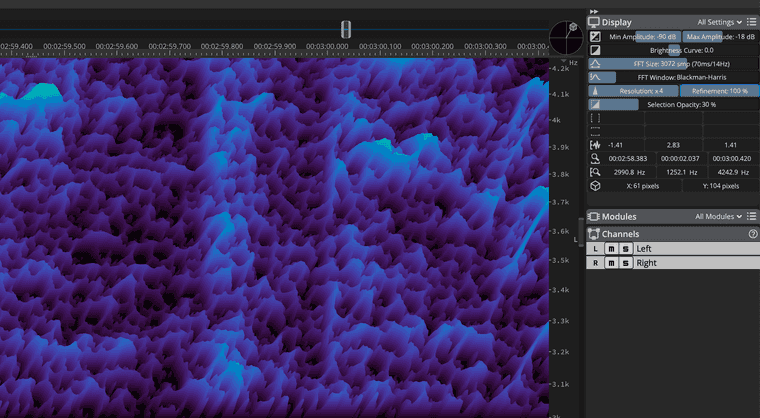[Free dsp] C++ FFT
-
No clue, I've never used one of them.
-
@griffinboy Ah ok - I'll look into that myself. Thanks for your help
-
@griffinboy Oh my boy that's amazing! I'll study that example closely and try to derive it for my own spectral things, should I succeed... For sure optimisation and vectorisation is very important with FFT. It is also often not the right tool despite it seems to be for the novice. For instance I've recently read about pitch shifting, where frequency domain seems to be the way but the issues it brings are raising as you go further. All that to say the path to DSP is a long, long path, and I am happy to have this as a starting point! Thanks @griffinboy !
-
I'm looking into implementing prism, which would be much more powerful for signal analysis. Looking at the data, this would be much more powerful than Loris (which uses kaiser window fft and the reassignment method).
https://eng.ox.ac.uk/control/news/prism-an-ultra-precise-fft-calculation/
For audio effects, if you want to preserve the signal, the constant Q method seems ideal:
https://en.wikipedia.org/wiki/Constant-Q_transform
I'll likely have a shot at this too at somepoint.
-
@griffinboy Awesome. your 2nd Tutorial Video.

-
hahaha.
Not quite as riveting as you would've hoped.I have scripted the next few videos though, I simply need to sit down and record and they'll be out. I've taken way too long on these
-
@griffinboy I am always very excited for your videos. I know FAUST and RNBO (may be a little bit in respect of other HISE mates) but core C++ with HISE always pushes me from my DSP comfort zone and Lethargy.
-
@griffinboy Excellent, and good thought on multi-resolution!
RX does multi-resolution offline, but SpectraLayers does it in real-time.
Refinement is another strategy, though you'll encounter regions of (quantum) uncertainty. The data isn't directly applicable, but can be extrapolated from. It can also provide additional information to the user in terms of visual feedback. Refinement is likewise offline in RX, but real-time in SL.



-
Ah I forgot that we had an fft expert here!
I may need to talk to you for advice. This little tangent has led me deep into FFT algorithms and I've discovered some really cool but complex modern research on the matter. -
Something I'm thinking of is combining Prism, with reassignment method.
Using reassignment to increase accuracy in the time domain as a post process.Have you looked at this, it's ridiculous:
https://eng.ox.ac.uk/control/news/prism-an-ultra-precise-fft-calculation/
I think they've patented it now, but I do have an old matlab project from two years ago where they created an early unoptimized version.
This wouldn't be for real time, but would surely be an amazing for frequency accuracy.
Overkill maybe? And way beyond my ability, but pretty interesting. Most resynthesis misses a ton of partials due to the fft method used to analyse the signal. But they always claim that these frequencies aren't important to perception. So maybe I'd be wasting a ton of effort xD
Stuff like Loris already sounds good perceptually. And perhaps insane resolution isn't a good thing: how are you going to group and track all those partials?I should probably give in and just use Loris... But for some reason I love going through the pain of doing dsp from scratch.
-
@griffinboy said in [Free dsp] C++ FFT:
Ah I forgot that we had an fft expert here!
@clevername27 Any getting started FFT video like your above image?
Every day I open up computer and think today I will learn new things. Will watch more videos on HISE. But sadly we have very few Video authors. -
Most dsp is shared via papers.
-
This post is deleted! -
@DabDab @griffinboy I appreciate the questions. To my knowledge, SpectraLayers is only software that does real-time FFTs like this, based mostly on brilliant work by creator Robin Lobel. The good news is if you want to simply do a 3D waterfall FFT (or Wavelet) display, the internet (including YouTube) is overflowing with how-tos, tutorials and walktlhoughts. Everything you need is readily available in HISEscript, and I can imagine it being more 100 lines of code at the most (50 if you're @Christoph-Hart).
I will divulge one secret from my own research: Remember that when drawing FFT or Wavelet-derived visualisations, few users (if any) know precisely what the graph should look like. In other words, you can lie to them. It's faster. "But what about processing that data?" Same answer. The user rarely knows precisely what it should sound like. (That being said, everything Robin is doing in SL is exactly correct.)
One other: Run your FFTs on the graphics card.
-
-
This post is deleted! -
@mmprod said in [Free dsp] C++ FFT:
What C++ libraries do you recommend?
If you're not doing on the graphics card, the best base-level algorithm (for my money) is FFTW.
Remember that at their heart, FFTs are very, very simple.
-
@clevername27 Any getting started FFT video like your above image?
Every day I open up computer and think today I will learn new things. Will watch more videos on HISE. But sadly we have very few Video authors.I think there's some words missing here — can you please re-state?
I will continue to drop videos (especially since I asked for the forum to be upgraded so I could). My videos me sharing all the code from my plugin, in bite-sized chunks. (You can thank @d-healey for inspiring me to do this.)
For instructional videos, @d-healey is the GOAT, and I would humbly suggest (if you haven't already) subbing to his Patreon (as I did when I started).
Regarding FFTs, I realise they may seem like a specific area of writing plugins, but FFTs (specifically DFTs) could be described as the foundation for all plugins (depending on your metrics).
-
@clevername27 @DabDab a “getting started” video on fft c++ could be very helpful for beginners who have never done this sort of implementation (like me). And often the content in videos is less dense than what you find in papers/easier to understand.
There are plenty of videos on fft theory already but for me it would be extremely helpful to have some sort of walkthrough on how to use a specific fft library(such as fftw), how to code a simple example algorithm, and perhaps how to import to scriptnode.
-
@mmprod Got ya. Hopefully, once I've got our new album out the door, I can return to this and do something like that for you guys.